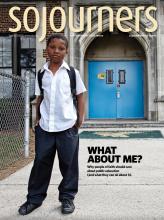A few weeks after the October 2002 plane crash that killed Sen. Paul Wellstone, his wife, Sheila, their daughter, Marcia, and five others, a Lutheran confirmation class visiting D.C. from Minnesota decided to stop by Wellstone’s office to pay their respects. As the group went through security at the Senate office building, one of the students—who had worked on the senator’s re-election campaign and was still wearing a Wellstone button—set off the metal detector. The officer took her to the side to wand her. As he was checking her, the guard said, “Not one other senator in this place knows my name; Paul Wellstone knew my kid’s name.” He and the student hugged each other, and both started weeping.
Paul Wellstone touched people’s lives in profound ways, mostly because he genuinely sought to live a life of integrity, in both public and personal matters. He once advised, “Never separate the life you live from the words you speak,” and those who knew him best said he honestly tried to follow that advice. (A Midwest political observer said the Right never knew what to do with Wellstone, because he lived “conservative values” at home while working for progressive change in the public sphere.)
Wellstone’s political career began when, as a political science professor at Minnesota’s Carleton College, he started working with farmers to block electric lines forcibly run through their farms—and he continued to organize and agitate on behalf of regular people for the rest of his days.
Bob Hulteen, a longtime Minneapolis-based activist (and a former Sojourners editor), said that Wellstone respected people more deeply than “any politician, or church leader, I’ve ever met—and, maybe most important, he didn’t take himself too seriously.” But Wellstone never underestimated the seriousness of his work for a better world, which is why, a decade after his passing, we asked several people who have been touched by his life in various ways to offer their thoughts on the legacy of a man who continues to offer a model of inspiration, integrity, and hope—attributes that are profoundly needed, in this and any election season.
—The Editors
Read the Full Article
